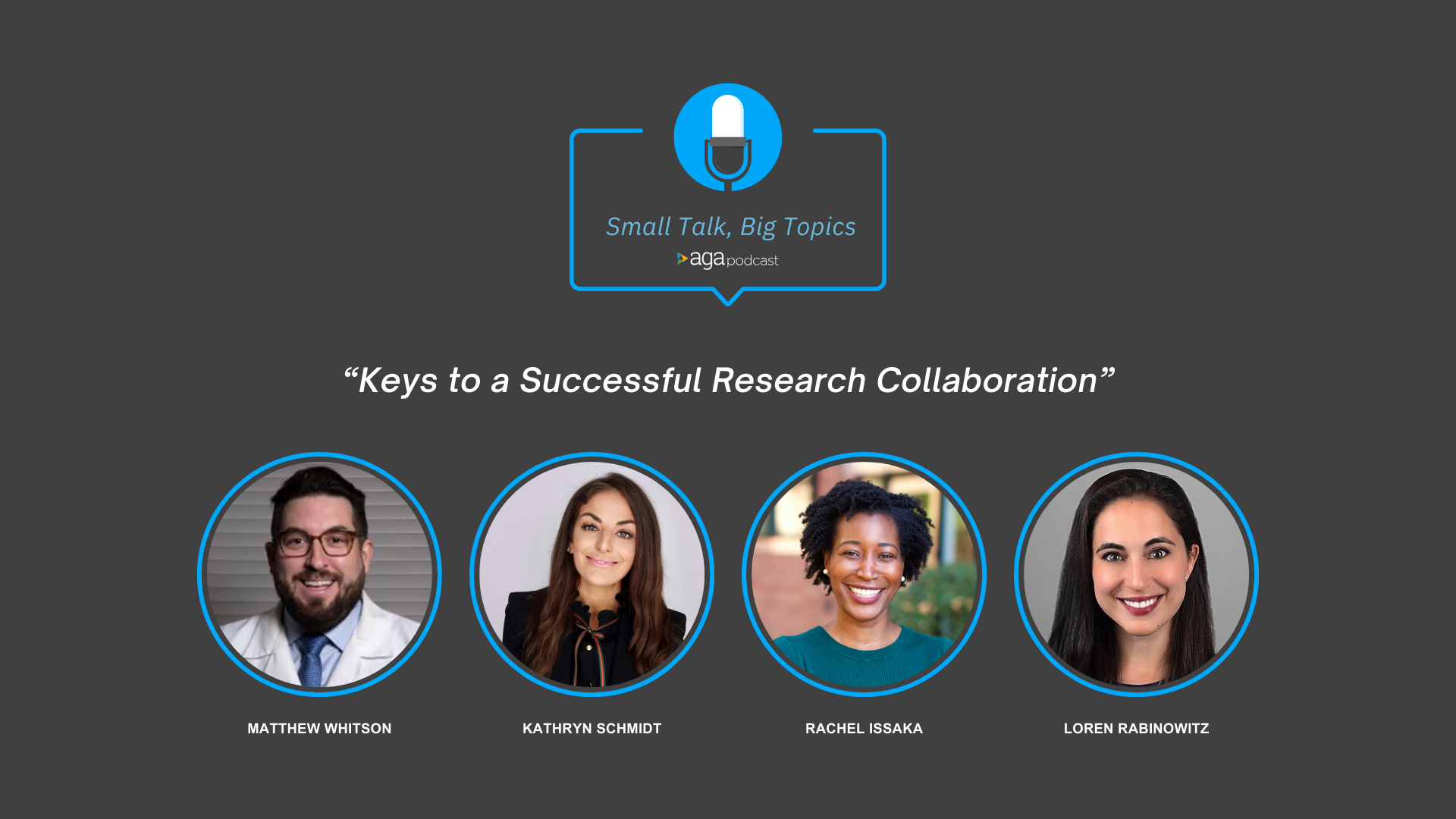Small Talk, Big Topics host Dr. Matthew Whitson and guest host Dr. Kathryn Schmidt are joined by Drs. Rachel Issaka, associate professor at the University of Washington School of Medicine and Loren Rabinowitz, instructor in medicine Beth Israel Deaconess Medical Center to discuss research collaborations in the realm of scholarly pursuit.
At the top of the episode, our guests introduce themselves and share about their work. They also share about their teams and stakeholders in the spirit of the conversation on collaboration.
Much of Dr. Rabinowitz’s work in IBD is focused on patient reported outcomes. On the gender equity side of things, her team is always thinking about how to make the world around us a more equitable space by encouraging community input during research. Dr. Issaka’s teams are also very multi-disciplinary and heavily involved in community engagement. What she has found to be most successful in this is the acknowledgement of individuals’ time contributions to the work they do. In every study, patients are paid the same amount as the physicians. Any time someone is investing their time, she believes it should be acknowledged. Dr. Rabinowitz has found that starting the process from an IRB perspective is invaluable. She also emphasizes the value of bringing your collaborating research team in as early as possible to best reflect everyone on the team.
Next, our guests share how they identify their collaborative partners and start a research project. For Dr. Issaka, many of her collaborations started organically by jumping in on pre-existing collaborative research groups or considering authors of pre-existing publications in that research space who could have valuable insight.
Dr. Rabinowitz echoes Dr. Issaka’s experience that many collaborations develop organically. She’s found that finding the right collaborative partner comes down to being a good collaborator yourself and “being the type of collaborator that you want.” When you show yourself to be a helpful contributor, other opportunities will come your way. She also emphasizes that you don’t have to be in a more senior position to be a desirable collaborator, it just takes a little bravery, she says. Dr. Rabinowitz underscores this by sharing how she sent plenty of cold emails in her own career and has been pleasantly surprised by the positive and interesting responses she received. With that in mind, she urges listeners not to be afraid to do the same, even if they are in junior positions.
As the episode winds down, Drs. Issaka and Rabinowitz share their best advice for trainees and first year faculty members who are starting to look for collaboration with others. Dr. Issaka’s fellowship mentor introduced her to his peers at conferences and emailed people on her behalf when she began her job search, which are things she now does for her own trainees. Dr. Rabinowitz points out that the processes of going for promotions and applying for grants require demonstrating that there is a track record of collaboration. She encourages trainees not to hesitate to ask for input on a publication if they’ve identified an individual they want to work with. This counts as a form of collaboration and will likely be helpful later on down the line.
To close the episode, Drs. Issaka and Rabinowitz share the most valuable piece of advice they offer to their own mentees. First, under promise and overdeliver – it’s always much better for someone to be surprised at your quality of work than disappointed. Second, be the kind of collaborator that you hope others would be for you. This includes being generous, thoughtful, kind and constructive.
Connect with this episode's guests:
Follow Dr. Rachel Issaka on X.
Follow Dr. Loren Rabinowitz on X.
Connect with this episode's guest host:
Follow Dr. Kathryn Schmidt on X.












